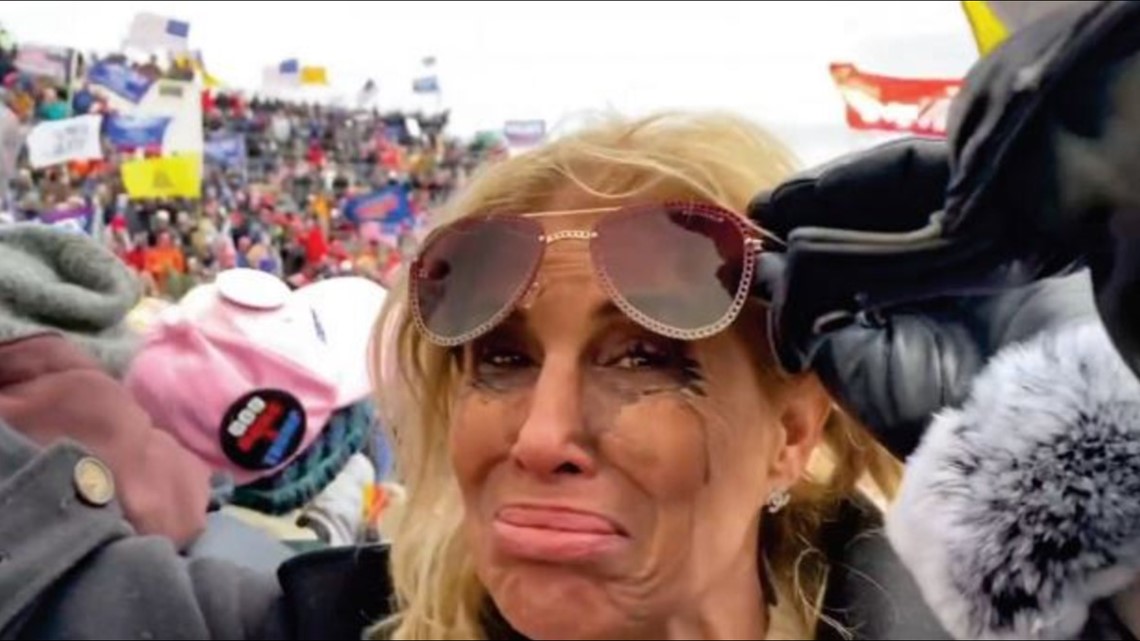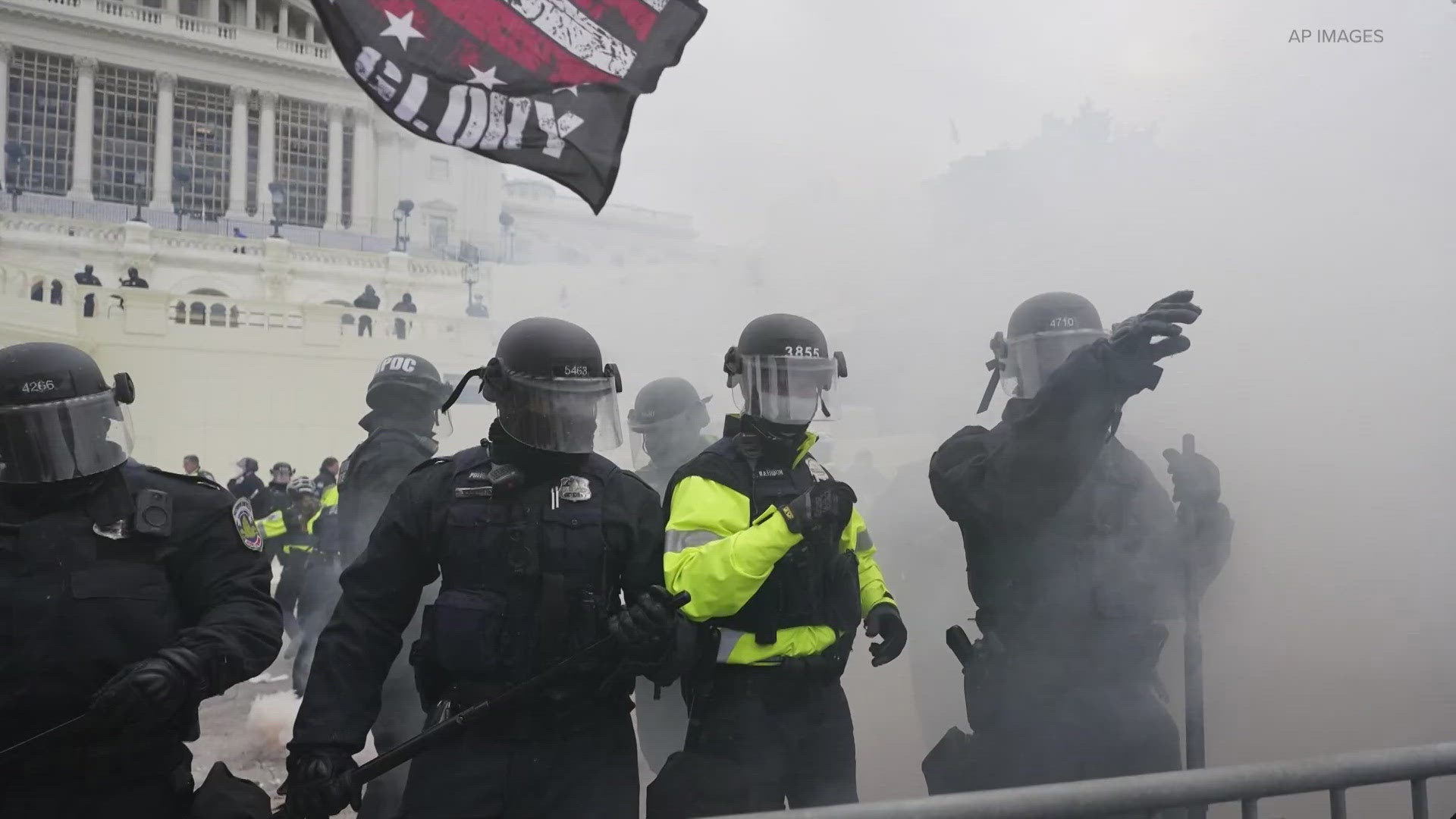WASHINGTON — A Beverly Hills salon owner who is now set for trial in August after withdrawing a guilty plea in her Capitol riot case filed notice Friday that she intends to raise a new line of defense: blaming former President Donald Trump.
The attorney representing Gina Bisignano, 56, filed the notice of public authority defense Friday in federal court in D.C. Public authority defenses carry inherent risk for defendants because they acknowledge committing a crime but claim to have done so because they were authorized, or reasonably believed they were authorized, to do so by a government official. In Bisignano’s case, according to her filing, she intends to claim she was acting under Trump’s authority when she obstructed the joint session of Congress on Jan. 6, 2021.
Bisignano was arrested in January 2021 less than two weeks after the riot. According to charging documents, Bisignano entered the U.S. Capitol multiple times and also encouraged others to enter the building. In a video that circulated on social media capturing the events of the day, Bisignano can be heard exhorting others, “Everybody, we need gas masks… we need weapons… we need strong, angry patriots to help our boys. They don’t want to leave. We need protection.”
Bisignano entered into a plea agreement in October 2021 on six counts, including two felony counts of civil disorder and obstruction of an official proceeding. As part of her plea, Bisignano admitted she joined others she knew from California in scaling a low wall while filming herself saying, “Okay, we are storming the Capitol. And I’m going up in there, I’m going to break into Congress.” She admitted she also encouraged other rioters who were attempting to force their way past police in the Lower West Terrace Tunnel and shouted at others to, “Break the window! Break the window!” into a congressional office before helping others onto a ledge who then did just that.
Bisignano then obtained a bullhorn from another rioter, which used to continue exhorting members of the mob to enter the building, shouting, variously, “This is 1776!” and “We the people are not going to take it anymore. You are not going to take away our Trumpy Bear.”


Quickly after entering her plea, however, Bisignano began to express regrets. In May 2022, she argued in court filings the Department of Justice had “bullied” her into pleading guilty to the obstruction charge, which she said she didn’t understand, and asked U.S. District Judge Carl Nichols to allow her to withdraw her guilty plea on that count. At the time, Nichols had dismissed the obstruction count from other Jan. 6 cases after ruling it required “some action with respect to a document, record or other object.” The D.C. Circuit reversed Nichols in April 2023. The U.S. Supreme Court heard arguments on the issue earlier this year and was expected to release a ruling on the applicability of the obstruction count in Jan. 6 cases sometime this month.
After warning her the fact of her prior guilty plea could be used against her at trial, Nichols granted Bisignano’s request to withdraw it. She’s currently set to go before a jury on that count on Aug. 5.
Bisignano is far from the first Jan. 6 defendant to blame Trump for her actions during the Capitol riot or to attempt an entrapment or public authority defense. In 2021, then-Chief Judge Howell denied a similar entrapment by estoppel defense raised by Kansas City Proud Boy William Chrestman.
[A President] cannot, in keeping with his constitutional function and his responsibilities under Article II, lawfully permit actions that directly undermine the Constitution,” Howell wrote. “Thus, a President cannot, within the confines of his constitutional authority, prevent the constitutionally mandated certification of the results of a Presidential Election or encourage others to do so on his behalf, nor can he direct an assault on the coequal Legislative branch of government.”
In February 2022, another defendant, Dustin Thompson, of Ohio, went further than Chrestman and informed the court he intended to call Trump as a witness at trial – describing both Trump and his personal attorney, Rudy Giuliani, “unindicted co-conspirators” in his case.
“It is anticipated that, when called as a witness, Donald J. Trump will testify that he and others orchestrated a carefully crafted plot to call into question the integrity of the 2020 presidential election and the validity of President Biden’s victory,” Thompson’s attorney, Samuel H. Shamansky, wrote in a brief to the court.
But U.S. District Judge Reggie Walton denied Thompson’s request and barred him from presenting a public authority defense at trial, explaining, as Howell had, that as head of the executive branch, Trump had no authority as president to order anyone to forcibly enter the Capitol on Jan. 6. Other judges on the D.C. District Court have uniformly agreed with that position and no defendant, to date, has been allowed to present a public authority defense.
Federal prosecutors filed a now-standard omnibus motion in limine Friday shortly after Bisignano’s filing that seeks to bar her from raising either a public authority defense, citing any actions or statements by Trump, or an entrapment defense claiming her actions were authorized by law enforcement.

